Beheading brings calls for tough laws to tackle UK jihadists
House arrest measures needed, says Carlile, and Clegg 'was wrong to block snooper's charter'

Pressure is mounting on David Cameron to reintroduce tougher anti-terror laws to tackle the threat of an estimated 250 British jihadists who have already returned from Iraq and Syria to the UK, and hundreds more who could return if they survive the American-backed campaign to stop IS.
Lord Carlile, the government's former independent adviser on anti-terrorism legislation, called this morning for the reintroduction of controversial control orders which would enable the authorities to put terrorist suspects under house arrest.
Control orders, introduced by Tony Blair in 2005, were replaced in January 2012 by so-called T-pims (Terrorism Prevention and Surveillance Measures) after judges ruled the control orders breached the human rights of terror suspects.The T-pims allow the intelligence and security services to carry out closer surveillance on suspects, but none are currently in operation.
Subscribe to The Week
Escape your echo chamber. Get the facts behind the news, plus analysis from multiple perspectives.

Sign up for The Week's Free Newsletters
From our morning news briefing to a weekly Good News Newsletter, get the best of The Week delivered directly to your inbox.
From our morning news briefing to a weekly Good News Newsletter, get the best of The Week delivered directly to your inbox.
The introduction of "beefed-up" T-pims would, said Carlile, ensure that people identified by "solid intelligence" as presenting a risk could be prevented from "activating their ideas". He added: "The T-pims ran out and the government decided to have no more for reasons I have never understood."
The Lib Dem peer's call comes as estimates of the number of British Muslims believed to have joined the Sunni fanatics of the Islamic State is revised up from 500 to as many as 1,500 or even 2,000.
The beheading of the US journalist James Foley by a jihadist thought to be a Londoner with the nickname 'Jihadi John' has brought a flood of calls to tackle what the Daily Mail's tough-talking columnist Richard Littlejohn calls "the enemy within".
Nigel Farage, the Ukip leader, called on Channel 4 News last night for jihadists re-entering the UK to be stripped of their British nationality even if they were born in this country.
Farage said it would doubtless be opposed by the European Court of Human Rights but the British government had a higher priority to guarantee the safety of its people. "The last thing we want is hundreds of people who have not just been radicalised but brutalised coming back into British society," he said.
There are also demands in the media for the police to arrest those people handing out pro-IS leaflets in London's Oxford Street and whoever was responsible for flying an IS flag in east London.
The Independent warns in an editorial that the Islamic State is a "seed-bed for terror against the West" and that home-grown terrorism could bring terror to Britain "on a scale that could eclipse even 9/11".
There will be understandable concern among British Muslim leaders that we could be rushing into unnecessarily repressive legislation to confront IS supporters. But the advice of Lord Carlile, a deputy high court judge, cannot be dismissed lightly. He is widely respected at Westminster and, if Parliament were sitting, there would almost certainly be widespread support for his call for tougher measures.
Carlile, appearing on Radio 4's Today programme, also called for the reintroduction of the controversial Communications Data Bill, designed to give police and the security services the right to obtain information about emails and data passing between suspected terrorists (though not the actual content of conversations).
The Bill was withdrawn by the Home Secretary Theresa May after opposition from Carlile¹s party leader, Nick Clegg, amid widespread criticism that it was a "snooper's charter".
"It is absolutely time to reintroduce the Communications Data Bill," said Carlile. "I have made it clear to Mr Clegg and others in my party that I think they were wrong to reject what was merely an attempt to ensure that what we are doing now and have been doing for years was encased in a solid Act of Parliament. We are not talking about intercepting people's telephone calls."
Michael Savage of The Times reveals that key recommendations sent to the government by a task force after the murder of Fusilier Lee Rigby have yet to be implemented. One was to create a new order banning groups that undermined democracy or used "hate speech". Whitehall sources have said that work is "ongoing".
Lord Dannatt, the former army chief, said on the Today programme that Parliament should be recalled next week to debate these issues.
But David Cameron, back on holiday in Cornwall, has shown no appetite for recalling MPs before they return to Westminster anyway on 1 September.
Create an account with the same email registered to your subscription to unlock access.
Sign up for Today's Best Articles in your inbox
A free daily email with the biggest news stories of the day – and the best features from TheWeek.com
-
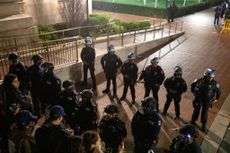 'Making a police state out of the liberal university'
'Making a police state out of the liberal university'Instant Opinion Opinion, comment and editorials of the day
By Harold Maass, The Week US Published
-
 8 looming climate tipping points that imperil our planet
8 looming climate tipping points that imperil our planetThe Explainer New reports detail the thresholds we may be close to crossing
By Devika Rao, The Week US Published
-
 Try 6 free issues of The Week Junior
Try 6 free issues of The Week JuniorSpark your child's curiosity with The Week Junior - the award-winning current affairs magazine for 8-14s.
By The Week Published
-
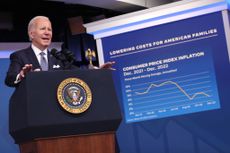 'So much for the triumph over inflation'
'So much for the triumph over inflation'Instant Opinion Opinion, comment and editorials of the day
By Harold Maass, The Week US Published
-
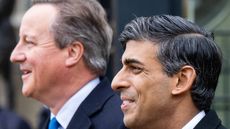 Is David Cameron overshadowing Rishi Sunak?
Is David Cameron overshadowing Rishi Sunak?Talking Point Current PM faces 'thorny dilemma' as predecessor enjoys return to world stage
By The Week UK Published
-
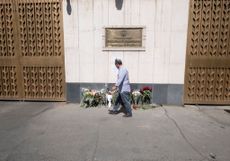 'Islamic State attacks from Afghanistan into Iran and now Russia should be wake-up calls'
'Islamic State attacks from Afghanistan into Iran and now Russia should be wake-up calls'Instant Opinion Opinion, comment and editorials of the day
By Harold Maass, The Week US Published
-
 Will Aukus pact survive a second Trump presidency?
Will Aukus pact survive a second Trump presidency?Today's Big Question US, UK and Australia seek to expand 'game-changer' defence partnership ahead of Republican's possible return to White House
By Sorcha Bradley, The Week UK Published
-
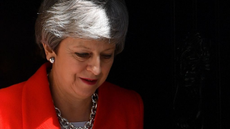 Farewell to Theresa May: a PM consumed by Brexit
Farewell to Theresa May: a PM consumed by BrexitTalking Point Maidenhead MP standing down at next general election
By The Week UK Published
-
 Shamima Begum: no way home
Shamima Begum: no way homeTalking point The embattled former Londoner has been in Syria since February 2015
By The Week UK Published
-
 Can Cameron put the Falklands sovereignty dispute to bed?
Can Cameron put the Falklands sovereignty dispute to bed?Today's Big Question Foreign secretary says issue 'not up for discussion' ahead of visit amid renewed push from Argentina
By The Week UK Published
-
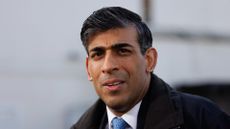 It's the economy, Sunak: has 'Rishession' halted Tory fightback?
It's the economy, Sunak: has 'Rishession' halted Tory fightback?Today's Big Question PM's pledge to deliver economic growth is 'in tatters' as stagnation and falling living standards threaten Tory election wipeout
By Harriet Marsden, The Week UK Published